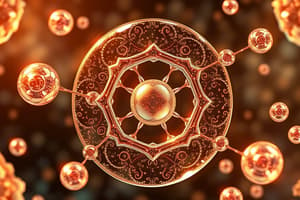Podcast
Questions and Answers
What is the primary reason for the low melting and boiling points of simple molecular covalent substances?
What is the primary reason for the low melting and boiling points of simple molecular covalent substances?
- The molecules are highly electronegative.
- The molecules are composed of atoms with high atomic masses.
- The weak intermolecular forces of attraction between the molecules are easily overcome. (correct)
- The strong covalent bonds between the molecules are broken.
What is the relationship between the relative atomic/molecular mass and the weak intermolecular forces of attraction?
What is the relationship between the relative atomic/molecular mass and the weak intermolecular forces of attraction?
- The relative atomic/molecular mass affects the covalent bonds between the atoms.
- The relative atomic/molecular mass has no effect on the intermolecular forces of attraction.
- The greater the relative atomic/molecular mass, the weaker the intermolecular forces of attraction.
- The greater the relative atomic/molecular mass, the stronger the intermolecular forces of attraction. (correct)
What type of bond is formed when a metal and a nonmetal interact?
What type of bond is formed when a metal and a nonmetal interact?
- Hydrogen bond
- Electrostatic bond
- Covalent bond
- Ionic bond (correct)
What is the term for a positively charged ion?
What is the term for a positively charged ion?
What occurs when atoms gain or lose electrons in ionic bonding?
What occurs when atoms gain or lose electrons in ionic bonding?
What is the reason for the higher melting points of longer simple covalent molecules?
What is the reason for the higher melting points of longer simple covalent molecules?
What is the charge of an atom when it gains an electron?
What is the charge of an atom when it gains an electron?
Why do elements in group 1 lose their one outer shell electron to become + cations?
Why do elements in group 1 lose their one outer shell electron to become + cations?
What is the formula for the ionic compound calcium oxide?
What is the formula for the ionic compound calcium oxide?
Why do ionic compounds have high melting and boiling points?
Why do ionic compounds have high melting and boiling points?
What is the charge of the ion formed by an element in group 3?
What is the charge of the ion formed by an element in group 3?
What is the function of the electron in the formation of an ionic compound?
What is the function of the electron in the formation of an ionic compound?
Study Notes
Melting and Boiling Points
- Simple molecular covalent substances have low melting and boiling points because the weak intermolecular forces of attraction can be easily overcome at low temperatures.
- As relative atomic/molecular mass increases, the size of the molecules increases, leading to stronger van der Waals forces. This results in higher melting and boiling points.
Ionic Bonding
- A metal and a nonmetal interact to form an ionic bond.
- A positively charged ion is called a cation.
- In ionic bonding, atoms gain or lose electrons to obtain a full outer shell, forming charged ions.
Properties of Ionic Compounds
- Longer simple covalent molecules have higher melting points due to the greater surface area of contact, resulting in stronger van der Waals forces.
- A negatively charged ion is called an anion.
- Elements in group 1 lose their one outer shell electron to become +1 cations because they want to achieve a stable electron configuration like the nearest noble gas.
- The formula for calcium oxide is CaO.
- Ionic compounds have high melting and boiling points due to the strong electrostatic forces of attraction between oppositely charged ions in their crystal lattice.
More on Ionic Bonding
- An element in group 3 forms a +3 charged ion.
- In ionic bonding, electrons are transferred from the metal atom to the nonmetal atom, resulting in the formation of oppositely charged ions.
Studying That Suits You
Use AI to generate personalized quizzes and flashcards to suit your learning preferences.
Description
Learn about the characteristics of simple molecular covalent substances, including their low melting and boiling points, weak intermolecular forces, and the energy required to break these forces. Understand how these substances differ from others in terms of their bonding and interactions. Test your knowledge of simple molecular covalent substances and their properties.




